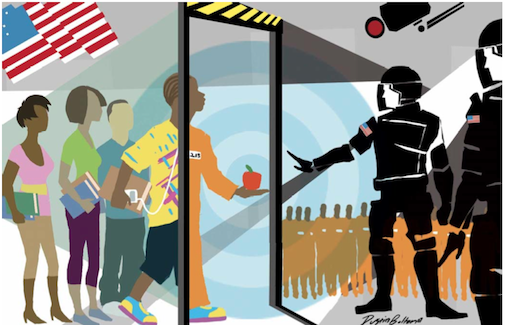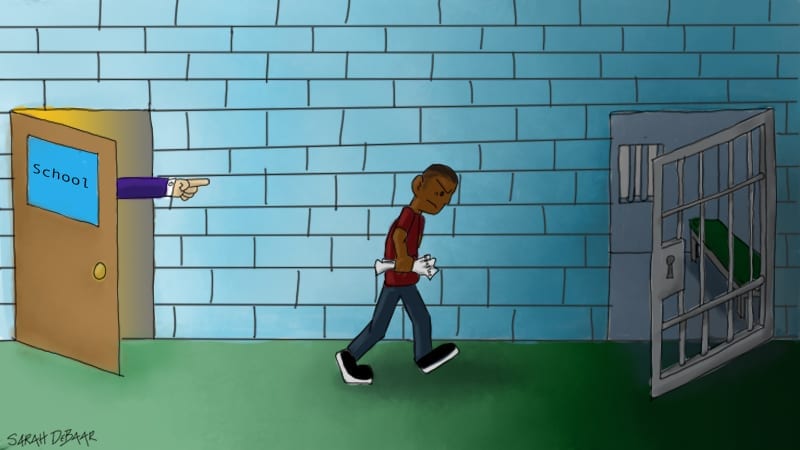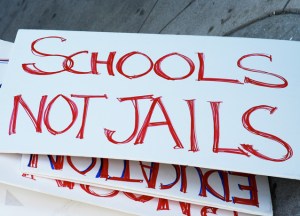

We have to talk about this uncanny prison resemblance some more…
It is good to see you again! Let’s get right into it. Last week we discussed the physical design of most modern American public schools. From the large, windowless buildings and crowded classrooms, to the lifeless hallways, it seems that American public schools are designed to prepare students to operate in another great American institution: prisons. But how uncanny is the resemblance between the inner workings of prisons and most public schools? What does this resemblance say about the health of the American school system if they are designed to look and operate like prisons? It’s time to find out:

There is ample amounts of research that confirms our public schools, particularly those in low-income neighborhoods with Black and Brown students, are oversurviellanced and over policed. The moment students step into their schools, they are greeted by metal detectors, school and city police, and K9 dogs. Police roam the hallways, survey classrooms, and guard the cafeteria. Students cannot get away from police in schools in the same way that inmates cannot get away from correction officers in prison.
This is a frightening realization for many reasons. First, students are not inmates or criminals. Students are students. They are young minds sent to an institution that is supposed to help expand their world view and ignite their curiosity, nothing about education should be policed. Second, there is a deluge of research that shows that correction officers in prisons, as well as police in schools, do not make the environment safer. In fact, police presence in prisons and schools actually leads to a more hostile environment, often leading to more violent altercations. Why? Because police are trained to see people with inherent suspicion, when you take that training and pair it with negative stereotypes about youth, poor youth, and Black youth, you get a system of discipline that relies upon viewing students, especially poor Black students, as potential inmates; criminals who just haven’t committed an offence-yet.
This type of attitude towards children will obviously affect their attitude towards school, and learning in general. Students will cease to see school as a place where they can ask hard questions, debate ideas, and challenge existing forms of thinking. They will see school as an inherently hostile place; one where innovative ideas are shut down, creative thinking is discouraged, and challenging authority, even justifiably, is met with severe punishment and potential arrest. Education, in the way it is presented in today’s schools, is unrecognizable. Today in its place is an unwelcoming, dare I say, psychologically violent approach to learning that is rooted in mistrust, punishment, and, most dangerously, obedience.

Obedience is a good thing. It is a virtue of the humble and wise. There is nothing inherently wrong with being obedient. Learning, however, true education, does not regard obedience as a necessary tool towards higher knowledge. To question conventionally held beliefs, to do your own research, or to form a well-researched but unpopular opinion usually means that you must venture outside of the realm of polite society to obtain the answers you truly want. This will cause you, in many respects, to become “disobedient”; but what I just described, is education. If education, higher learning, and expanding of the mind often causes individuals to behave in ways that are outside of polite society, to be “disobedient”, then why is obedience so highly praised and rewarded in school? What kind of students is the American education system actually trying to produce? And why does it try so hard to produce them?
Like we discussed earlier, obedience is inherently a good thing. We should want our students to have a respect for authority and rules, and to go about seeking higher learning in a way that is respectful and orderly. That being said, is there anything respectful and orderly about a school system that houses fear, hostility, and narrow-mindedness? That breeds aggression, frustration, and criminalization? That, by its very design, inhibits educational growth and creative thoughts? Why should students, or anyone for that matter, be obedient to such a system? Obedience to a vicious educational system is desired, but is incredibly amoral and dangerous. Students should not be rewarded, and therefore encouraged, to turn a blind eye to a flawed education system. Likewise, students who acknowledge and choose to confront the problems within the education system should be encouraged to challenge them and help produce a stronger and more effective way to teach and learn. They should not see school as a prison, and schools should not reinforce this notion in its design or structure. An education system that demands obedience, especially in place of creative thought or civil discourse, does not deserve to be called an education system.

Available at: <https://youtu.be/Hngimiscj6M> [Accessed 11 June 2021].
BCPHR.org was designed by ComputerAlly.com.
Visit BCPHR‘s publisher, the Boston Congress of Public Health (BCPH).
Email [email protected] for more information.
Click below to make a tax-deductible donation supporting the educational initiatives of the Boston Congress of Public Health, publisher of BCPHR.![]()
© 2025-2026 Boston Congress of Public Health (BCPHR): An Academic, Peer-Reviewed Journal
All Boston Congress of Public Health (BCPH) branding and content, including logos, program and award names, and materials, are the property of BCPH and trademarked as such. BCPHR articles are published under Open Access license CC BY. All BCPHR branding falls under BCPH.
Use of BCPH content requires explicit, written permission.